|
 Lepiota alopochroa Lepiota alopochroa
SynonymsLepiotula alopochroa
Agaricus alopochrous
BiostatusPresent in region - Exotic
Images (click to enlarge)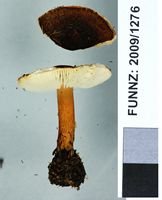
Owner: J.A. Cooper | 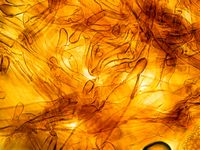
Caption: cap trichoderm
Owner: J.A. Cooper | 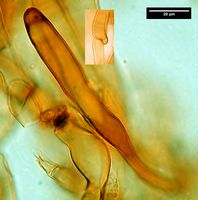
Caption: cuticle
Owner: J.A. Cooper | 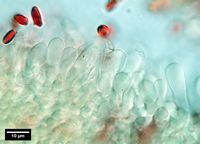
Caption: cheilocystidia
Owner: J.A. Cooper | 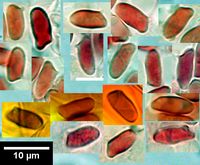
Caption: spores (melzers)
Owner: J.A. Cooper | 
Caption: Fig. 15. E. Lepiota alopochroa (BERK. & BR.) SAM (ZT 68/418): spores. | 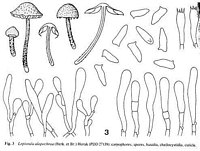 |
Article: Horak, E. (1980). Fungi Agaricini Novazelandiae. IX. Lepiotula (Maire) Locquin ex Horak. New Zealand Journal of Botany 18(2): 183-188 (http://www.rsnz.org/publish/abstracts.php).
Description: Pileus 15-30 mm diam., hemispheric when young becoming convex or umbonate-campanulate; reddish brown or chestnut-brown; velutinous to tomentose at centre, towards estriate margin breaking up into small appressed fibrillose concolorous squamules on a pale reddish brown background; margin covered by irregular persistent lumps of veil. dry. Lamellae free, ventricose, densely crowded. pallid to pale argillaceous, edge albofirmbriate. Stipe 20-50 x 2-3 mm, cylindric; fibrillose; white at apex. pale red-brown towards base, covered by rust brown or red-brown, short, irregular fibrillose girdles and squamules of veil, cortina absent; dry. fistulose, single and cespitose. Context: white in pileus, dark brown in base of stipe. Odour sourish Chemical reactions on pileus :KOH - negative Spores 8-9 x 2.5-3.5 µm, spurred, hyaline, dextrinoid, smooth, germ pore absent. Basidia 25-28 x 6-8 µm. 4-spored. Cheilocystidia 20-46 x 5-8 µm. cylindric or subclavate, hyaline, thin-walled, occasionally with several transverse septa, forming sterile seam on gill edge. Cuticle a palisade of erect subclavate or subfusoid cells (25-100 x 10-16 µm), with brownish pigment in the membrane, clamp connections present.
Habitat: on soil among litter in forests (under Metrosideros, Rhopalostylis). New Zealand. Sri Lanka (type).
Notes: The New Zealand fungi agree in all essential features with L. alopochroa originally described from Sri Lanka (Ceylon; cf. Pegler 1972: 168). Macroscopically this agaric resembles L. fulvella Rea (1918) whose cuticlar structure, however, is markedly different
Article: Horak, E. (1980). On Australasian species of Lepiota S.F. Gray (Agaricales) with spurred spores. Sydowia 33: 111-144.
Habitat: Habitat. - On soil in coastal, broad-leaved forests. - New Zealand.
Notes: Remarks. - The type material of this Ceylonese Lepiota was reexamined by PEGLER
(1972: 168) and the New Zealand collections agree sufficiently well to be considered the
same species.
L. alopochroa is characterized by the brilliant red-orange or ferruginous colours on pileus
and stipe. It has these features in common with three other representatives of Lepiota viz.
L. fulvella REA (1918), L. castanea QUAL. (1880) and L. infelix HoRAK. However, L.
alopochroa is well separated from these taxa either by smaller spores or different
structure and pigmentation of the pileal cuticle (cf. BABOS, 1964: 69).
Macroscopically L. alopochroa is also similar to L. pyrrhaes (BERK. & BR.) SACC.
(1887) but the spores of the latter species are distinctly smaller (PEGLER, 1972: 167).
|